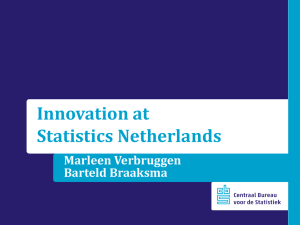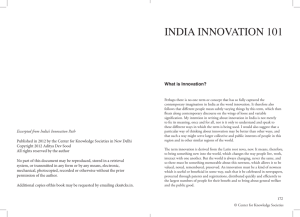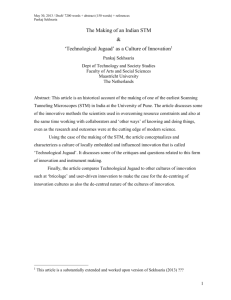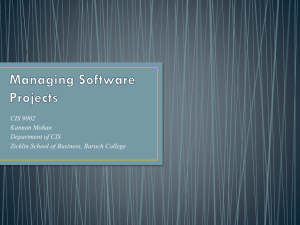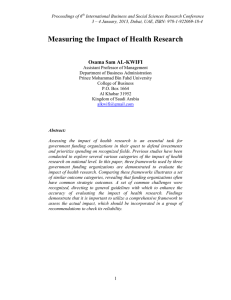Proceedings of 20th International Business Research Conference
advertisement
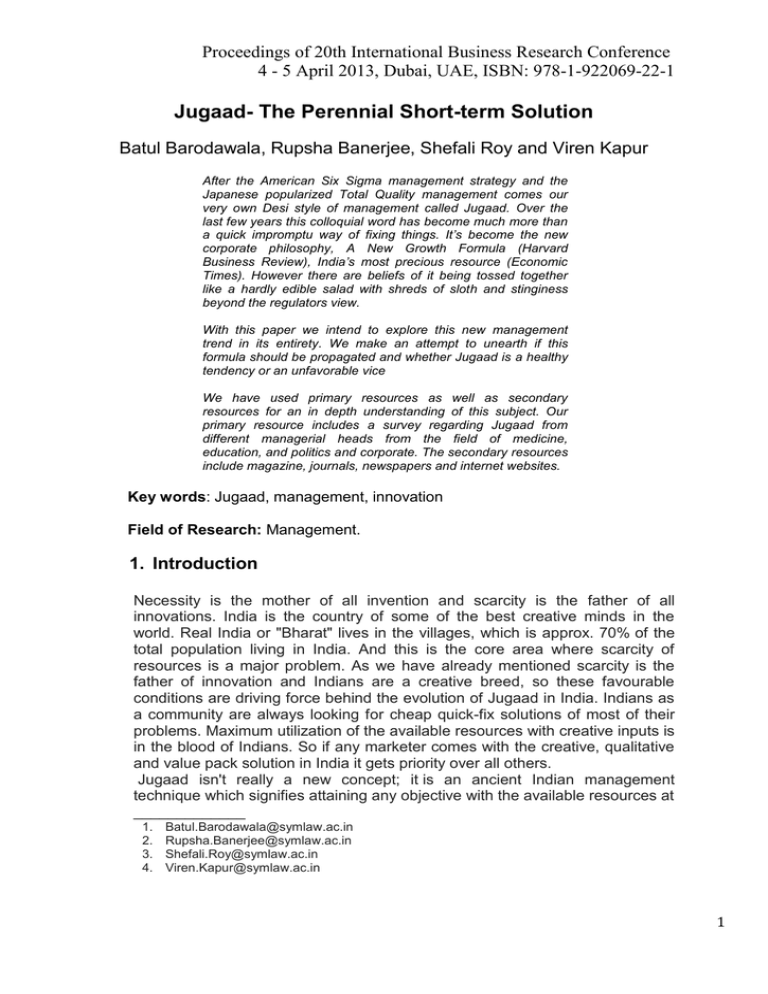
Proceedings of 20th International Business Research Conference 4 - 5 April 2013, Dubai, UAE, ISBN: 978-1-922069-22-1 Jugaad- The Perennial Short-term Solution Batul Barodawala, Rupsha Banerjee, Shefali Roy and Viren Kapur After the American Six Sigma management strategy and the Japanese popularized Total Quality management comes our very own Desi style of management called Jugaad. Over the last few years this colloquial word has become much more than a quick impromptu way of fixing things. It’s become the new corporate philosophy, A New Growth Formula (Harvard Business Review), India’s most precious resource (Economic Times). However there are beliefs of it being tossed together like a hardly edible salad with shreds of sloth and stinginess beyond the regulators view. With this paper we intend to explore this new management trend in its entirety. We make an attempt to unearth if this formula should be propagated and whether Jugaad is a healthy tendency or an unfavorable vice We have used primary resources as well as secondary resources for an in depth understanding of this subject. Our primary resource includes a survey regarding Jugaad from different managerial heads from the field of medicine, education, and politics and corporate. The secondary resources include magazine, journals, newspapers and internet websites. Key words: Jugaad, management, innovation Field of Research: Management. 1. Introduction Necessity is the mother of all invention and scarcity is the father of all innovations. India is the country of some of the best creative minds in the world. Real India or "Bharat" lives in the villages, which is approx. 70% of the total population living in India. And this is the core area where scarcity of resources is a major problem. As we have already mentioned scarcity is the father of innovation and Indians are a creative breed, so these favourable conditions are driving force behind the evolution of Jugaad in India. Indians as a community are always looking for cheap quick-fix solutions of most of their problems. Maximum utilization of the available resources with creative inputs is in the blood of Indians. So if any marketer comes with the creative, qualitative and value pack solution in India it gets priority over all others. Jugaad isn't really a new concept; it is an ancient Indian management technique which signifies attaining any objective with the available resources at _____________ 1. 2. 3. 4. Batul.Barodawala@symlaw.ac.in Rupsha.Banerjee@symlaw.ac.in Shefali.Roy@symlaw.ac.in Viren.Kapur@symlaw.ac.in 1 Proceedings of 20th International Business Research Conference 4 - 5 April 2013, Dubai, UAE, ISBN: 978-1-922069-22-1 hand. The practitioners of Jugaad use the combination of present knowledge and innovation in utilizing whatever resources may be at hand without asking or waiting for additional resources. The term Jugaad can also mean alternative arrangement, a quick fix through the use of an unconventional but innovative method. The essence of Jugaad is to improvise, and to quickly and cheaply cobble a solution together from the materials you have at hand. The practitioners of Jugaad are often called Jugaadis or Jugarists. These Jugaadis can perform any kind of job everything from arranging for a driver‘s license, getting a permit to do business, and obtaining gas cylinders, to solving production problems. Jugaad at times could tilt on the illegal side of the ethical line; it could be dangerous and therefore leads us to believe that it sprouts more from a need and not so much from the excitement of doing things yourself. Similar concepts have also been found in other economies. In China it's called 'Zizhu Chuangxin', in Brazil it's called 'Gambiarra', and in France it's called 'System D'. In recent times, it is coming alive outside emerging markets. So as we proceed with this paper we find out what ticks people to use or abuse this management idea. 2. Review of Literature Ingo Bobel, (2012)1: Jugaad is a major innovation mindset. Here since scarcity rules our lives, we need to optimally utilize what little resources we have with us, since we are bound by constraints of time and money free enterprises or business and the managers involved in them are the ones mainly running the show. Thus the ones involving lowest cost to spurn out innovative wonders are the ones that take the biggest piece of cake in the end. He also mentions the economic problems of ―what to produce‖, ―how to produce‖ and ―whom to produce for‖ by economically friendly choices. All this can be achieved by the Jugaad mindset, Prof Ingo states. Further mentioning that Jugaad is all about adaptation in a certain intelligent way; by defining that intelligence here doesn‘t mean ―seeking sophistication or perfection by over-engineering products but rather about developing good enough solution to get the job done.‖ Charles Dhanraj and T Krishnan (2011)2: India needs to move beyond Jugaad and move on to Systematic Innovation. They state that at a small scale level Jugaad is, to an extent, acceptable. However complete reliance on this strategy is hardly advisable. Jugaad is an outcome of three constraints constraints of space, time and resources. Focus should be put on eliminating these constraints so that work can be done efficiently. By embracing Jugaad we in a way embrace compromise. We end up settling with just the satisfactory and don‘t accomplish the excellent. ―Functionality rules in Jugaad. Aesthetics and efficiency take a backseat in Jugaad. It is not the best solution that one could arrive at. It is sub-optimal. The point is to satisfy, not to optimize.‖ The challenge out country faces is to surpass Jugaad and aspire for Systematic Innovation, which is backed by technology, efficiency and planning, as a wholesome and comprehensive society cannot emerge simply by improvisation. 2 Proceedings of 20th International Business Research Conference 4 - 5 April 2013, Dubai, UAE, ISBN: 978-1-922069-22-1 Sidin Vadukut(2011)3: Harsh criticism of the concept of Jugaad. It is stated that Jugaad is nothing but a temporary way of ridding yourself off a problem and not a permanent way of solving it. And all you do is make the problem take a detour as sooner or later it comes back to haunt you with greater intensity than before. In certain situations people have to resort to Jugaad but making a habit out of it is not something to take pride on. Aversions are expressed in the manner in which every management guru and business schools have exalted this management trend as it is simply a short term method of dealing with crisis and should be avoided. 1. ―Jugaad: A New Innovation Mindset” Journal of Business and Financial Affairs, Volume I th No. 3. Accessed on 8 January, 2013. th 2. ―Beyond Jugaad,‖ Business Standard, February 7, 2011. Accessed on 8 January 2013. 3. ―Die Jugaad, die,‖ livemint.com & The Wall Street Journal, December 9, 2011. Accessed on th 9 January 2013. Navi Radjou, Jaideep Prabhu & Simone Ahuja(2012)4: Delve into the mindset of Jugaad innovators, mainly discussing the six underlying principles and showing how these principles can actively be used in practical life. They go about the entire concept by sharing many of these unheard, stories of some common names of this great country, who have been actively practicing Jugaad since they began trade. They have become entrepreneurs and innovators who have used some easy, convenient methods to rise victorious in the daily emerged market. These names are nobody famous, yet they have somewhat helped to establish the position of Jugaad as a future successful management technique. Jugaad Innovation shows most of the free-thinks and innovators and leaders everywhere that this is the right time for everyone to adopt the method of Jugaad and for it to rise and emerge and a powerful and essential business tool in the Western economies. Virender Kapoor (2010)5: Various aspects of Jugaad are covered in this book; networking being a major one. According to the author, any marketer would agree that networking and Jugaad go hand in hand. One never knows who might turn out to be a saviour in hard times. Jugaad has everything to do with handling people, situations and relationships hence the art of diplomacy is most essential here. ―The example of Chanakya‘s principles of diplomacy can be applied to break any dead lock, conflict, problem existing between people or groups of people. Jugaad is in a way extension of Chanakya‘s Principles of Diplomacy, to handle people, problems and situations on a day to day basis.‖ It has been very well exemplified the subject by comparing it with a coin. As a coin has a flip side, so does Jugaad. It has been specifically mentioned that Jugaad is an immediate solution to a "problem" and not a "crisis". It can be of help in a situation where the problem could be averted or solved and hence saving the whole from the crisis. 3 Proceedings of 20th International Business Research Conference 4 - 5 April 2013, Dubai, UAE, ISBN: 978-1-922069-22-1 3. Research Methodology 3.1 Objectives of the Study 1. To find out the potential of Jugaad in the different managerial sectors of India. 2. To find out the challenges and opportunities in using Jugaad. 4. ―Jugaad Innovation: Think Frugal, Be Flexible, Generate Breakthrough Growth‖ Random Business / th Random House India, 2012. Accessed on 8 January, 2013. th 5. "The Rise and Rise of Jugaad‖ Matrix Publishers, 2010. Accessed on 9 January, 2013. 3.2 Research Method Sample, Source of Data Collection & Statistical Tool The research is partially based on primary data which has been collected from 40 people from the field of education, politics, and medicine and corporate from various cities of India. Data was collected through a questionnaire and in depth interviews of the sample belonging to the Age Group from18-65. Secondary data in the form of articles published in books, journals, magazines, research papers, newspapers and reports was also be referred. Statistical tool applied is the bar graph. 4. Findings and Discussion Awareness of Jugaad 120 100 80 60 40 20 0 Yes No Figure 1 When we reviewed the data, we found that 80% of the students were familiar with Jugaad and 20% were not. All the politicians we interviewed were familiar with this trend, whereas 80% and 90% of the people from the field of corporate and medicine were acquainted with it. 4 Proceedings of 20th International Business Research Conference 4 - 5 April 2013, Dubai, UAE, ISBN: 978-1-922069-22-1 Usage of Jugaad 120 100 80 60 40 20 0 Yes No Figure 2 80% of the students use Jugaad to get their work done and 90% of the politicians make use of this management trend to do their job. In the corporate and the medicine sector 80% and 100% of the professionals make use of Jugaad. Applicability to the field of work 80 60 40 20 0 Yes No Maybe Figure 3 The students and the politicians think that Jugaad is essential to their field and hence 70% of them have said yes, whereas 20% students and 10% politicians said no and the rest went with maybe. 50% of the corporate professionals and 60% of the medicine persons replied yes while 20% and 10% said no. The rest said maybe. Appropriate for Management in India 100 50 0 Yes No Maybe Figure 4 Amongst all the students, 70% think Jugaad is fitting though 20% said they thought it wasn‘t suitable for management in India. 10% went for maybe. 70% of the politicians, 80% of the corporate persons and 70% from the field of medicine said yes. None of them picked maybe. 5 Proceedings of 20th International Business Research Conference 4 - 5 April 2013, Dubai, UAE, ISBN: 978-1-922069-22-1 Advantages 90 80 70 60 50 40 30 20 10 0 Saves Time Saves Resources Less Money Less Effort Promotes Innovation Figure 5 In this case, 20% of the students said that Jugaad helps them save time, while 50% of them said that it helps save resources, 0% said that is results in less money and 20% said that is lowers effort and finally 10% said that it Promotes Innovation. Coming to the Politicians, 60% said that it saves time, 20% said that it saves resources, 30% said that it results in less money, 40% said that if requires less effort and 40% said that it Promotes Innovation. In the Corporate field, 80% said it saves time, 10% saves resources, 10% less effort and 20% promotes innovation. In the field of medicine, 60% said saves time, 50% said saves resources, 40% said less money, 50% said less effort and finally 50% said it promotes innovation. Disadvantages 80 70 60 50 Inefficient Management Breeds Lethargy 40 30 20 10 0 Blurs line between Legal and Illegal Risky Outcome Figure 6 In this survey, the 20% of the students said that it is inefficient management, 20% said that it breeds lethargy, 40% said that it blurs line between legal and illegal and 10% claimed it to be risky outcome. Among the politicians, 50% said that it is inefficient management, 10% said it breeds lethargy, 30% said it blurs line between legal and illegal and 20% claimed a risky outcome. Among the 6 Proceedings of 20th International Business Research Conference 4 - 5 April 2013, Dubai, UAE, ISBN: 978-1-922069-22-1 Corporates, 60% said inefficient management, 10% said breeds lethargy, 30% said it blurs the line between legal and illegal and 20% claimed that it has a risky outcome. In the field of medicine, 40% said inefficient management, 30% said it breeds lethargy, 50% said it blurs the line between legal and illegal and 70% claimed a risky outcome. Suitable time span 150 100 50 0 Short-term Long-term Both S Figure 7 In the case of students, 80% said short-term while 20% said both. Among Politicians, 90% said short-term and 10% said both. In Corporates, 100% said short-term. In the field of medicine, 90% mentioned short-term while 10% mentioned both. None of the fields mentioned long term. Jugaad culture resulting in mediocrity 80 60 40 20 0 Yes No Maybe Figure 8 In case of Students, 10% said Yes, 40% said No, 50% said Maybe. Among Politicians, 70% said Yes, 10% said No and 20% said Maybe. In Corporates, 40% said Yes and 60% said Maybe. No one said No. In the field of medicine, 30% said Yes, 20% said No and 50% said Maybe. 7 Proceedings of 20th International Business Research Conference 4 - 5 April 2013, Dubai, UAE, ISBN: 978-1-922069-22-1 Adoption of Jugaad by western countries 100 80 60 40 20 0 Yes No Maybe Figure 9 In case of Students, 40% said no and 60% said maybe. Among Politicians 10% said yes, 70% said no and 20% said maybe. From the corporate sector, 20% said no and 80% said maybe. And finally in the field of Medicine, 20% said yes, 50% said no and 30% said maybe. Potential for growth 100 50 Yes 0 No Maybe Figure 10 In the case of Students, 50% said yes, 40% said no and 10% said maybe. Among Politicians, 20% said yes, 80% said no and 0% said maybe. In the field of Corporate, 10% said yes, 40% said no and 50% said maybe. In the field of medicine, 10% said yes, 40% said no and 50% said maybe. 4. 1 Analysis of the primary data After the conduction of the survey, we have come to the conclusion that most of the parties to the survey, though know about Jugaad and agree with the fact that they use Jugaad to get their work done, they would not prefer doing it on a long term basis. They also think it is good concept to nurture yet there are certain drawback which if cleared would make it a widespread practicable concept. Our survey that we have reviewed suggests that Jugaad is only suitable for short term. It means that Jugaad in its essence cannot be used for a long time hence faction that we surveyed, believe that this characteristic of it makes it a mediocre management trend. Therefore we analyze the various responses that we got in order to find out how this mediocrity can be trounced. And for it to become a lasting and an ongoing concept we need people to be patient with it and give it the leeway to evolve into a more substantial hypothesis. 8 Proceedings of 20th International Business Research Conference 4 - 5 April 2013, Dubai, UAE, ISBN: 978-1-922069-22-1 Jugaad is usually associated with an idea that lacks quality and enduring worth hence focus should be made on smoothening the frayed ends. The byproduct of Jugaad shouldn‘t be left as it is. It should be worked upon to enhance it. Jugaad is usually resorted to when there exists an emergency or a period of crisis. The time that the attempted Jugaad has managed to buy for people facing exigency should be consumed to increase the utility of derivative. This leads to an improvement in the quality of it and makes it capable of being used for a long term. 5. Conclusion Jugaad is being increasingly touted as a new definition of frugal innovation. The ground reality of Jugaad can be equated to; when a welder uses a tack instead of a full weld, not bothering to understand the structural necessity of a full weld in the final product or a motorcycle helmet is made without the required safety standards and hence is largely driven by the urge to save cost and make more profit. It is generally myopic and unscientific. It insists that a practical solution can be found for any problem through intense experimentation. And it encourages getting off the beaten track in search of a solution. These repeated bounce-backs and course-corrections can be attributed to a powerful, gritty, improvisational energy that‘s been running through Indian society for some time. Its only drawback is that it can be used only for a short span of time. A business which has to function for a long span of time requires carefully strategized plans. Its core tenet is to not give up. This is just the beginning, so we will see more of this movement. It's probably fair to say that India is at the forefront of this approach simply because India has scarcity and unpredictability in space. As we've seen, because emerging markets face scarcity on a grand scale and across the board, Jugaad innovators who operate within them are masters of frugality and the art of doing more with less. Western companies, however, are facing scarcity too— as they confront dwindling natural resources and value-conscious and demanding consumers. We can conclude by saying that Jugaad is being widely used not only throughout India, but throughout the world also. But its relevance is definitely questionable and debatable. 6. Recommendations and suggestions All genius and innovative ideas have underlying faults in them, Jugaad similarly (though not blatantly for those practicing Jugaad in all its gusto) has some major flaws that if not rectified will not facilitate its evolution into a major management culture. The drawbacks we will be addressing in this paper are as follows: The defects of recurring improvisation The tendency of it to get illegal 9 Proceedings of 20th International Business Research Conference 4 - 5 April 2013, Dubai, UAE, ISBN: 978-1-922069-22-1 Improvisation is the complete opposite of planning and premeditating the outcome. The trouble with the tendency to improvise is that sometimes it may turn out to be extra ordinary but it always has a chance to spurn the wrong way with disastrous end results. Yet it is the key component on which Jugaad thrives. However for the optimum kind of Jugaad to be carried out heed has to be paid to who indulges in it. A lot of people in our country may have an original bent of mind however not everyone has the potential to be a good quality Jugaadist. According to us a person with a complete know-how about the subject matter should have the liberty to carry it out. The responsibility as well the power to exercise it should be on the shoulders of an expert instead of someone who has half baked knowledge about the relevant issue at hand. Also the expert performing Jugaad ought to weigh what is at stake. If the stakes are too high he should refrain from going with it without the required planning and hence not use the ‗Jugaad‘ way out. The roots of Jugaad are in the nitty gritty if this society. Earlier it was only found at the lower levels where innovation used to be huge but the scope of expertization was limited however Jugaad has now crept into large scale corporate as well. Now the line between legal and illegality has become so narrow, that crossing over to the other-side isn‘t too difficult. Eg:- Hawala markets (lower level), Satyam and Enron scam (higher level). The question raised here is how to make sure that while practicing Jugaad one does not take the law into their own hands. First and foremost it is essential for every company to have a legal advisor or a group of them to notify the company regarding the kind of activities that exceed legally permissible perimeter. Apart from that the management of the company should also be ethical enough to avoid this kind of Jugaad. Training programs and workshops should encourage this view. When an illegal kind of Jugaad is done by an employee the immediate superior shouldn‘t simply ‗take care of it‘ but call off the entire idea and take austere action against the conduct of this sort no matter how valuable that employee maybe to the organization. Hence when the organization culture strictly opposes such a Jugaad the employees automatically refrain from carrying it out A lot of people are prejudiced against Jugaad as it thwarts the traditionally held beliefs of management. Despite its certain faults, that have the potential to be corrected, Jugaad if used carefully and with expertise could be like the genie in the magic lamp; with appearances of something completely basic but if polished the right way capable of creating wonders. 10 Proceedings of 20th International Business Research Conference 4 - 5 April 2013, Dubai, UAE, ISBN: 978-1-922069-22-1 Bibliography Primary sources:A survey was taken from 40 people the medical, political, educational and corporate sector. Secondary sources:Books:1. Navi Radjou, Jaideep Prabhu and Simone Ahuja, (2012). “Jugaad Innovation: Think Frugal, Be Flexible, Generate Breakthrough Growth” 2. Virendra Kapoor, (2010). “Rise and Rise of Jugaad” Journals:1. Charles Dhanraj and T Krishnan (2011). ―Beyond Jugaad,‖ Business Standard, 2. Ingo Bobel, (2012). ―Jugaad: A New Innovation Mindset” Journal of Business and Financial Affairs, Volume I No. 3 3. Sanjeey Singh, Gagan Deep Sharma, Mandeep Mahendru (2011). ―The Jugaad Technology (Indigenous Innovations) (A Case Study of Indian Origin)”, Asia Pacific Journal of Research In Business Management, Volume II, Issue 4 Magazine:1. Josey Puliyenthuruthel, (2011). ―A World of Jugaad‖, Business Today 2. Reena Jana, (2009). ―From India, The Latest Management Fad‖ Bloomberg BusinessWeek 3. Vijay Govidarajan, (2011). ―Jugaad – A Model for Innovation‖, Forbes India Newspapers:1. Boski Gupta, (2012) ―Not Just Quick-fix, Jugaad Is Here to Stay‖ DNA 2. Namrata Singh, ―Jugaad: A Stepping Stone to Process Led Innovation‖ Times of India 3. Philip Mcclellam, (2012) ―Is Jugaad Going Global?‖ New York Times 4. S.A.Aiyar, (2010). ―Jugaad Is Our Most Precious Resource‖ Economic Times 5. Sidin Vadukut(2011) ―Die Jugaad, die,‖ livemint.com & The Wall Street Journal 6. Uttara Choudhury, (2010). ―Jugaad Enters Management Jargon‖ DNA 11 Proceedings of 20th International Business Research Conference 4 - 5 April 2013, Dubai, UAE, ISBN: 978-1-922069-22-1 Copy of the Questionnaire Q1) Are you familiar with the term "Jugaad" in the management sense? o Yes o No Q.2) Do you make use of "Jugaad" to get your work done? o Yes o No Q.3) Do you think it is applicable to your field of work? o Yes o No o Maybe Q.4) Do you like many reputed companies think "Jugaad" is good for Indian Management? o Yes o No o Maybe Q.5) If you are a believer of Jugaad, why so? o Saves time o Saves resources o Less money o Less effort o Promotes innovation Q.6) If you are against Jugaad, why so? o Inefficient management o Breeds lethargy o Blurs line between legal and illegal o Risky outcome 0.7) For what time span is it feasible to use Jugaad? o Short term o Long term o Both Q.8) Is "Jugaad" culture resulting in mediocrity of Indian Companies compared to the Western counterparts? o Yes o No o Maybe Q.9) Do you think the Western countries should adopt the "Jugaad" style of management? o Yes o No o Maybe Q.10) Do you think "Jugaad" has the potential to be the global face of management in future? o Yes o No o Maybe 12
